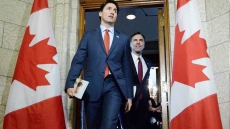OTTAWA — Prime Minister Justin Trudeau is sitting down with premiers to finalize a long-awaited national plan on climate change, but once those discussions wrap up, they will move right into a heated debate over health care funding.
"We want to talk about health care," Saskatchewan Premier Brad Wall said Wednesday, pointing out that the first ministers meeting beginning Thursday in Ottawa is the second such gathering devoted to curbing greenhouse gas emissions.
"We hope even if it's only shoe-horned into the agenda, that we can have some discussion about what's going to be taking place in health care funding."
That discussion is expected to take place at a working dinner Friday evening — after the official meeting on climate change is through — when federal sources say Trudeau will tell the provincial and territorial premiers he is ready to listen to any of their concerns unrelated to the environment.
The only topic anyone is expecting to come up, however, is health care spending, and whether the Liberals are willing to budge on cutting the annual increase to the Canada Health Transfer from six per cent to three per cent — a plan brought in by the Conservatives that is set to take effect in April 2017 — and what they might ask for in return.
The premiers had demanded some face time with Trudeau on the subject, saying they wanted that to come before they were willing to talk about climate change. The working dinner is viewed as a compromise meant to allow room for talking about health care without derailing the main event.
No one is expecting a new deal to be reached by the time dessert is served — especially if there are lingering tensions from the climate change talks — but those on both sides of the argument are hoping for a meaningful discussion that lays the groundwork for more detailed negotiations to come.
That would include a Dec. 19 meeting of finance ministers, which the health ministers have been invited to join, but sources from two provincial governments said they are also still insisting on a full-fledged gathering of premiers with Trudeau on the issue early next year.
Ontario Premier Kathleen Wynne said she and her fellow premiers are agreed that a three-per-cent annual increase is not enough.
"There is a real unanimity across the country among premiers and ministers of health that the cut from a six-per-cent increase to a three-per-cent increase is going to have severe impacts on our health care system," said Wynne.

"I just don't see the wisdom in forcing cuts in the health care system at this moment in time," echoed B.C. Premier Christy Clark.
The federal government, meanwhile, has been trying to separate the amount of the health transfer from a new health accord, which they view as a way to set shared goals on priorities such as home care and mental health.
Senior government sources also said Trudeau plans to stick by his message that funding for the accord must be targeted at agreed upon priorities.
The Liberal government has promised $3 billion over four years to improve access to home care — separate from the transfer payments — but is open to increasing that amount, as well as the time period, if it applies to other shared priorities such as mental health.
That could be where they find a compromise, as the provinces were concerned about having to deliver new services and then be stuck covering their cost after the time-allocated funding ran out.
A senior federal source also said there is little opposition to the idea that Quebec might negotiate its own agreement, as has happened in the past.
Health Minister Jane Philpott said Wednesday that nothing has been decided yet.
She also suggested funding for home care and other priority areas could go up in the future if it proves to be a good investment.
"If in fact we come to some agreement around investments in mental health, for example, and we see that our investments have done well and that in fact people are able to get better access to care, are able to achieve better health outcomes, that would certainly encourage us to continue our investments," Philpott said.
"That's one of the reasons why it's important for us to make sure we target those funds and we look at the outcomes achieved," she said.



